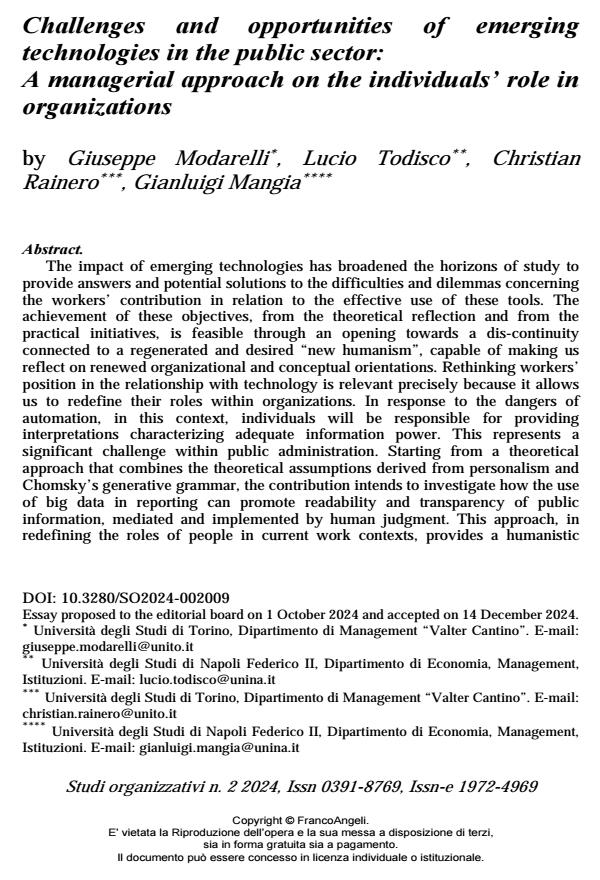Challenges and opportunities of emerging technologies in the public sector: A managerial approach on the individuals’ role in organizations
Titolo Rivista STUDI ORGANIZZATIVI
Autori/Curatori Giuseppe Modarelli, Lucio Todisco, Christian Rainero, Gianluigi Mangia
Anno di pubblicazione 2025 Fascicolo 2024/2
Lingua Inglese Numero pagine 35 P. 175-209 Dimensione file 434 KB
DOI 10.3280/SO2024-002009
Il DOI è il codice a barre della proprietà intellettuale: per saperne di più
clicca qui
Qui sotto puoi vedere in anteprima la prima pagina di questo articolo.
Se questo articolo ti interessa, lo puoi acquistare (e scaricare in formato pdf) seguendo le facili indicazioni per acquistare il download credit. Acquista Download Credits per scaricare questo Articolo in formato PDF

FrancoAngeli è membro della Publishers International Linking Association, Inc (PILA), associazione indipendente e non profit per facilitare (attraverso i servizi tecnologici implementati da CrossRef.org) l’accesso degli studiosi ai contenuti digitali nelle pubblicazioni professionali e scientifiche.
The impact of emerging technologies has broadened the horizons of study to provide answers and potential solutions to the difficulties and dilemmas concerning the workers’ contribution in relation to the effective use of these tools. The achievement of these objectives, from the theoretical reflection and from the practical initiatives, is feasible through an opening towards a dis-continuity connected to a regenerated and desired “new humanism”, capable of making us reflect on renewed organizational and conceptual orientations. Rethinking workers’ position in the relationship with technology is relevant precisely because it allows us to redefine their roles within organizations. In response to the dangers of automation, in this context, individuals will be responsible for providing interpretations characterizing adequate information power. This represents a significant challenge within public administration. Starting from a theoretical approach that combines the theoretical assumptions derived from personalism and Chomsky’s generative grammar, the contribution intends to investigate how the use of big data in reporting can promote readability and transparency of public information, mediated and implemented by human judgment. This approach, in redefining the roles of people in current work contexts, provides a humanistic framework of analysis in management, contrary to some predictive literary interpretations.
L’impatto delle tecnologie emergenti ha ampliato gli orizzonti di studio per fornire risposte e potenziali soluzioni alle difficoltà e ai dilemmi che riguardano il contributo dei lavoratori in relazione all’uso efficace di questi strumenti. Il raggiungimento di tali obiettivi, dal punto di vista della riflessione teorica e delle iniziative pratiche, risulta fattibile attraverso un’apertura verso una dis-continuità connessa a un rigenerato e ambìto “nuovo umanesimo”, capace di far riflettere su rinnovati orientamenti organizzativi e concettuali. Ripensare la posizione dei lavoratori nel rapporto con la tecnologia ha rilevanza proprio perché permette di ridefinire i loro ruoli all’interno delle organizzazioni. In risposta ai pericoli di automatizzazione, in questo contesto, gli individui saranno responsabili di fornire interpretazioni che caratterizzano un adeguato potere informativo. Ciò rappresenta una sfida di rilievo all’interno della pubblica amministrazione. Partendo da un approccio teorico che unisce gli assunti teorici del personalismo e della grammatica generativa di Chomsky, il contributo intende comprendere come l’uso dei big data nella reportistica possa favorire leggibilità e trasparenza delle informazioni pubbliche, mediata e implementata dal giudizio umano. Questo approccio, nel ridefinire i ruoli delle persone nei contesti lavorativi attuali, fornisce un quadro di analisi umanistico nel management, contrario ad alcune predittive interpretazioni letterarie.
Parole chiave:Big Data; management della conoscenza; strategie manageriali; settore pubblico; tecnologie emergenti
- Integrating artificial intelligence into performance measurement and management: a systematic literature review Alberto Sardi, Giuseppe Modarelli, in International Journal of Productivity and Performance Management /2026 pp.1
DOI: 10.1108/IJPPM-05-2025-0362 - Editorial: Organizational governance in a cha(-lle)nging world: A critical perspective between potentials and fears Giuseppe Modarelli, in Corporate Governance and Organizational Behavior Review /2025
DOI: 10.22495/cgobrv9i2editorial - Foreseeing the future: anticipatory governance as a response to the technological and managerial challenges in the public sector Lucio Todisco, Gianluigi Mangia, Paolo Canonico, Federica Langella, in International Journal of Public Sector Management /2025 pp.1
DOI: 10.1108/IJPSM-03-2025-0109
Giuseppe Modarelli, Lucio Todisco, Christian Rainero, Gianluigi Mangia, Challenges and opportunities of emerging technologies in the public sector: A managerial approach on the individuals’ role in organizations in "STUDI ORGANIZZATIVI " 2/2024, pp 175-209, DOI: 10.3280/SO2024-002009